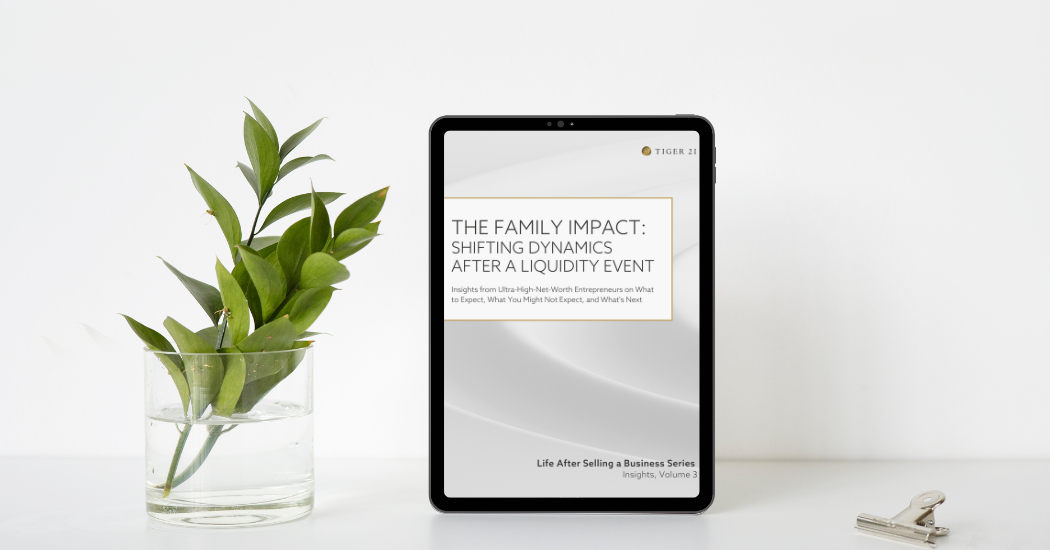How to Get the Advice You Need When You Need It Most: A Guide for UHNWIs

There is an art to asking for and receiving meaningful advice that can inform life’s important decisions. As a successful person, getting this kind of advice can be challenging, particularly if you are someone who has achieved significant wealth. For example, you might be getting plenty of advice, but it’s not particularly relevant to your situation. Consultants can offer their expertise, but their thinking might be biased. Your friends can weigh in, but their experience might be significantly different to your own.
Many issues that ultra-high-net-worth individuals face are unique. Perhaps you’ve experienced one or more of these yourself:
- Figuring out what’s next after the sale of a business
- Designing an estate plan that ensures children are motivated and productive citizens
- Navigating family dynamics with parents and siblings
- Investing the right way to preserve wealth for generations to come
- Determining how to make philanthropic contributions more impactful
- Finding purpose – and having fun – at this stage of life
Well-placed words of wisdom can be invaluable when it comes to topics like these. So where can you turn to get the help you need?
Strategies for Getting Meaningful Advice
Regardless of the issues you face, it’s not as difficult as you might think. Detailed below are three strategies and a number of questions you can ask yourself that will increase your chances of finding the right advice from the right people when you need it most. I’ve also shared a few personal lessons I’ve learned about advice-giving and -receiving, as well as some practical tips to help you have the best experience possible.
Strategy 1: Find Your Focus
Before reaching out to others, you should take some time to find your focus. Use the questions below to think through your situation. Putting your thoughts in writing can help you be more prepared when you are ready to seek advice.
Why do I need advice?
Identify specifically why you want advice. Is there:
- An issue to resolve?
- An opportunity to consider?
- A lingering problem to address?
What is the present situation?
Next, describe your current reality and the details of the situation as it stands today. Think through both the good and the bad, as well as any observations or questions you have.
At this point, it is also helpful to reflect on your current thinking about the situation – your mindset, your emotions, and any concerns you have. Here are a few additional questions to consider:
- Am I being completely honest with myself about this situation?
- What am I most worried about? What is my greatest hope? Greatest fear?
- Am I making too many assumptions?
- Am I too locked in to what I want the answer to be that I’m not open to new ideas?
What does the future look like?
Once you’ve laid out your current reality, shift gears to think about your future reality. Envisioning a different, more desirable future can help motivate you when it’s time to take action. Ask yourself:
- What will it be like when I have resolved this issue or moved forward on this opportunity?
- How will life be different?
- How will I feel about things? About myself?
What’s the real dilemma?
This next step is to define your dilemma. This can help you clarify what you want as well as what is holding you back. Boil it down to one sentence:
“I want __________, but ______________.”
What type of advice do I want?
Finally, determine how others can best help you. Do you want:
- Clarity about the situation?
- Coaching to increase awareness, knowledge, or skills to tackle what’s ahead?
- Courage to take action?
- Counsel on how to move forward?
Strategy 2: Determine Who Can Advise?
Once you find your focus, you’re ready to determine who is best suited to advise you. Certainly you can benefit from one-on-one conversations with others. But in many instances, approaching a group can be a better strategy that will yield the most valuable insight. In a group setting you’ll receive broader input. You’ll hear diverse perspectives and new ways of thinking. You’re also likely to receive more objective advice, and benefit from the lessons others have learned.
Obviously, it’s important to approach the right group for advice. Peer learning groups are some of the most valuable groups you can join. I would encourage you to look for a group where members:
- Have relevant knowledge or expertise
- Are in a similar stage of personal or professional life
- Are willing to share and assist others
- Feel free to speak openly because the group is grounded in confidentiality
- Are not afraid to tell you truth
- Have your best interests at heart
TIGER 21 is a group I am a part of where I have observed the giving and receiving of incredibly impactful advice. This is largely because TIGER 21, which serves ultra-high-net-worth individuals, is founded on the core principles of confidentiality, stewardship, intentionality, and community.
I currently serve as a Chair of a TIGER 21 Group in Nashville and have seen first-hand how the right advice given at the right time in the right spirit has been a game-changer for a Member. Together, we processed some meaty issues, such as repairing a broken relationship with a sibling over a family business, restructuring a business partnership that was no longer working, and thinking about practical ways to teach children about stewardship.
We also help Members get the most out of their opportunities personally and professionally. For example, we’ve helped Members determine if/how to pursue a new business idea, whether to purchase a home or how to make an alternative investment.
One of the reasons advice-giving and -receiving works so well in TIGER 21 is that, in many ways, the Group functions like a personal board of directors for each Member. Whenever someone brings forward an issue or opportunity, the Group does what it can to assist. The key is keeping a clear focus on helping that Member identify meaningful and actionable steps to move forward in whatever way he/she thinks is best.
This focus is one of the secrets to skilled advising and what makes the experience so impactful in TIGER 21. Let’s take a closer look at how that works in a typical TIGER 21 monthly meeting.
Strategy 3: Identify the Insight
To help a Member get meaningful insight and an action plan to move forward, the TIGER 21 Group observes several best practices. The Chair and Members each play a role in the process.
Facilitated conversation
The best exchange of ideas happens when an experienced facilitator is managing the conversation. This individual is not a Member of the Group, but someone who creates the right environment for the processing of issues, who keeps track of time, moves the conversation along, and ensures all voices are heard. In TIGER 21, these responsibilities are assumed by the Group Chair. Additionally, the Chair often works in advance with Members to help them prepare their thoughts around an issue or opportunity following steps similar to those outlined above in Strategy 1, Find Your Focus.
Two-step process
Sometimes feedback from others can fall into a swirl of misguided advice, presumptuous guidance, or the overstepping of boundaries. To avoid this and other advice-giving pitfalls, a TIGER 21 Chair guides their Group through a simple two-step process. Once a Member has provided some context about an issue or opportunity, the Chair instructs the Group to provide help, as follows:
- Ask clarifying questions – This is an opportunity for the Group to pose questions to get deeper insight about the situation, to find out what the Member has tried, what he/she is concerned about, or to probe further on a specific detail.
- Offer unfiltered feedback – Once questions have been asked, the Chair calls on each Member of the Group to offer a point of view, to share similar experiences, lessons learned, things to avoid, or opportunities to leverage.
Active Listening
During the exchange of advice, all Members of the Group must be present and focused on the conversation, listening for what is said as well as what isn’t said. This level of listening ensures all the important information is on the table and each unique perspective is shared and heard.
In TIGER 21, a Chair facilitates active listening among Members by keeping the conversation on track, helping Members pose open-ended questions, and encouraging feedback that is non-judgmental and unbiased.
A few other tips for getting advice
Wherever you choose to turn for advice, keep a few things to increase the value of the experience.
- Stay open to any advice that is given. Don’t focus on why something won’t work. Instead consider how something might work.
- Don’t be defensive. Resist the temptation to explain what you’ve done in the past or rationalize your situation. If possible, try to accept what is so you can focus on what’s next.
- Check your ego at the door. Don’t sugarcoat things to look good. The more forthcoming you are about the reality of your situation, the more likely you are to get feedback that will really help.
- Clarify your takeaways. As the conversation is wrapping up, summarize and articulate what you are taking from the conversation that is most meaningful to you.
- Commit to the first step. Publicly state the first step you are willing to take. By sharing it with others, you’re more likely to act. This also allows the Group to help you stay accountable for action going forward.
- Appreciate the feedback. No matter what is shared, let others know you appreciate their time and attention. Whenever a good friend of mine asks me for advice, she always says “Thank you. That’s helpful.” Even if she isn’t going to follow my advice, her response lets me know that my input is valued.
- Be courageous. Opening up about your personal or professional life is not for the faint of heart. Your willingness to be vulnerable about your most pressing issues will undoubtedly yield honest and heartfelt feedback. Your courage will prompt others to bring forward what matters most to them, too.
Asking for and receiving meaningful advice is an essential part of living a successful life. Remember to take the time to find your focus, determine who can help and look for the insights that are most meaningful and actionable. In the process, you may get some game-changing advice – and find an opportunity to change the game for someone else, too.
If you are interested in learning more about TIGER 21 Membership, click here.
About the Author
Elise Mitchell is a TIGER 21 Chair in Nashville, as well as a three-time founder and seasoned business advisor. She has more than 25 years of experience steering leaders and their companies through complex business challenges, working with global brands including Walmart, P&G and Hilton Hotels.
Connect with Elise Mitchell on LinkedIn. If you are located in the Nashville area and are interested in learning more about the local TIGER 21 Group and Chapter activities, click here.
About TIGER 21
TIGER 21 is an exclusive global community of ultra-high-net-worth entrepreneurs, investors, and executives.
Explore the TIGER 21 Member ExperienceMember Insight Reports








